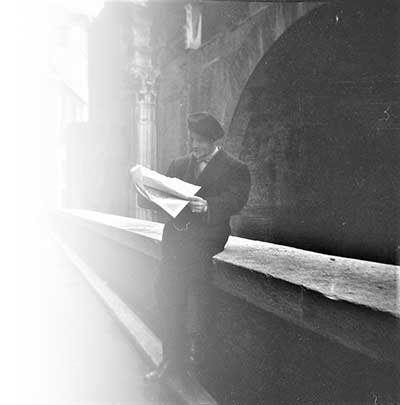I t is 1985. Ten thousand miles across the globe, a visitor enters a modest courtyard that serves as a meeting place for one of India’s most respected spiritual leaders, the Shankaracarya of Kanchipuram. Making his way past the entourage of attendants and followers, the visitor reverently greets the ninety-one-year-old yogi and silently hands him a photograph. The Shankara looks down at the faded picture, and a slow smile steals across his kindly face. The photograph is of Paul Brunton.
The West has gone East. Zen centers and vegetarian restaurants are everywhere; suburbanites are meditating; yoga, karma and guru are household words. Trace the origins of this eastward turning, however, and names like Watts and Suzuki come to mind—not Paul Brunton (1898-1981), the author, philosopher, and pioneer architect of the East-West bridge.
Since the early 1930s, Brunton’s books on Eastern thought and Western culture have sold nearly two million copies. His first book, A Search In Secret India, is credited with introducing the philosophy of yoga to Westerners. The American Theosophist has hailed Brunton as “one of the West’s most perceptive thinkers and deepest students of Ancient Wisdom.” Yet he remains oddly unknown to an entire generation of Western spiritual seekers.
Or perhaps not so oddly. In 1959—with the publication of his final book and at the height of a career filled with offers to found ashrams and to establish journals—Brunton disappeared. Once a journalist bent on traveling to strange lands to report about Eastern spirituality, he chose to abandon his worldly role and to traverse instead those regions of the heart where all traditions become one.
What did he discover during this two-decade journey into his own being? No one can say for sure. We can only guess at the magnitude of the changes he underwent by the clues in the legacy he left behind: his notebooks—some 10,000 pages of what Brunton described as a more “mature” version of his earlier work. Since 1984, Larson Publications has published a complete set, sixteen volumes of The Notebooks of Paul Brunton, including Perspectives; The Quest; Practices for the Quest and Relax and Retreat; Meditation and The Body; Emotions and Ethics and The Intellect; The Ego and From Birth to Rebirth; Healing of the Self and The Negatives; Reflections on My Life and Writings; The Human Experience and the Arts in Culture; The Sensitives; The Orient; The Religious Urge and the Reverential Life; Relativity, Philosophy and Mind; Inspiration and the Overself; Advanced Contemplation and The Peace Within You; and Enlightened Mind, Divine Mind.
To read the “new” Brunton is to rediscover an old friend. Wise and compassionate, he offers candid advice about the pitfalls and possibilities of spiritual practice. And just as the world changed enormously over the last twenty years of his life, so did Brunton evolve and adapt his approach to better meet the needs of today’s seekers. Although he was still looking to the Orient for inspiration and guidance, he did not believe that Westerners need shave their heads or sit cross-legged in a forest to attain spiritual fulfillment. Rather, he offered a simple, straightforward guide to how philosophical insights of East and West can help to create beauty, joy, and meaning in our lives—as we live them, not as they might have been lived had we been born at another time.


